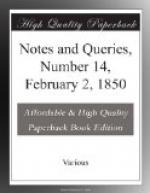HIBERNICUS
Jan. 8. 1850.
* * * * *
THE OFFICE OF THE MASTER OF THE REVELS.
Your esteemed correspondent, “J.G.N.,” asks (p. 158.) for the meaning of the letters “C.K.M.R.” and “T.S.” appended to the passage he quotes from the Common-place Book of Charles, Duke of Dorset. I think I can tell him. “C.K.M.R.” stands for Charles Killegrew, Master of the Revells; and “T.S.” means Thomas Skipwith, one of the patentees of Drury Lane Theatre, who died in 1710. Sir Henry Herbert died in 1673; and his successor in the office was Thomas Killegrew. This person had previously been Sir Henry’s deputy; and I am in possession of a curious list of MS. instructions, “the heads of what I gave to Mr. Thos. Killegrew the 29th of March, 1664,” in the hand-writing of Sir Henry Herbert. Thomas Killegrew died in 1683, and was succeeded by Charles Killegrew; the degree of the relationship between the two Killegrews I do not know; and in the London Gazette, Dec. 7. 1685, there is a notice commanding all “rope-dancers, prize-players, strollers and other persons showing motions and other sights, to have licenses from Charles Killegrew, Esq., Master of the Revells.”
Charles Killegrew was one of the managers of Drury Lane Theatre at the time of the union of the King’s and Duke of York’s servants; and Drydaen calls him, in the Dedication to his translation of Juvenal’s Satires, his “ingenious friend.”
Upon the death of the latter, in 1725, Charles Henry Lee succeeded to the vacant office; who, dying in 1744, Solomon Dayrolle was appointed in his room. I do not know the date of the decease of the last-named gentleman; but with him, I believe, died the office of the Master of the Revells. The ancient jurisdiction of the Master of the Revells has been transferred, by 1737, by legal authority, to a “licenser of the stage,” who, in conjunction with a deputy licenser, performed all the functions of the ancient office.
EDWARD F. RIMBAULT.
* * * * *
REPLIES TO MINOR QUERIES.
The Red Maids of Bristol.—The answer to the query of “MR. A. GRIFFENHOOF” (No. 12. p. 184.), why the “Red Maids” in Bristol are so called, is, because they are dressed in bright scarlet gowns. They are the incumbents of a benevolent school, founded in 1627, by one of Bristol’s great benefactors, Alderman Whitson, of pious memory, for the maintenance and education of 40 girls, which number has now increased to 120. Your correspondent’s curiousity respecting their name might be fully satisfied, and his interest increased, if he should happen to be in Bristol on some sunny afternoon in the later part of May, or the beginning of June, by a sight of this bright “regiment of women”—the gay colour of their gowns subdued by the quaintness of their fashion, and the clean whiteness of their aprons, collars, &c.—proceeding, in double file, towards the downs, for air and recreation. An account of their foundation may be found in Barret’s Hist. of Bristol, p. 415. “Blue-Boys,” so called for a similar reason, are a parallel case of much more general occurance. Yours, &c.




